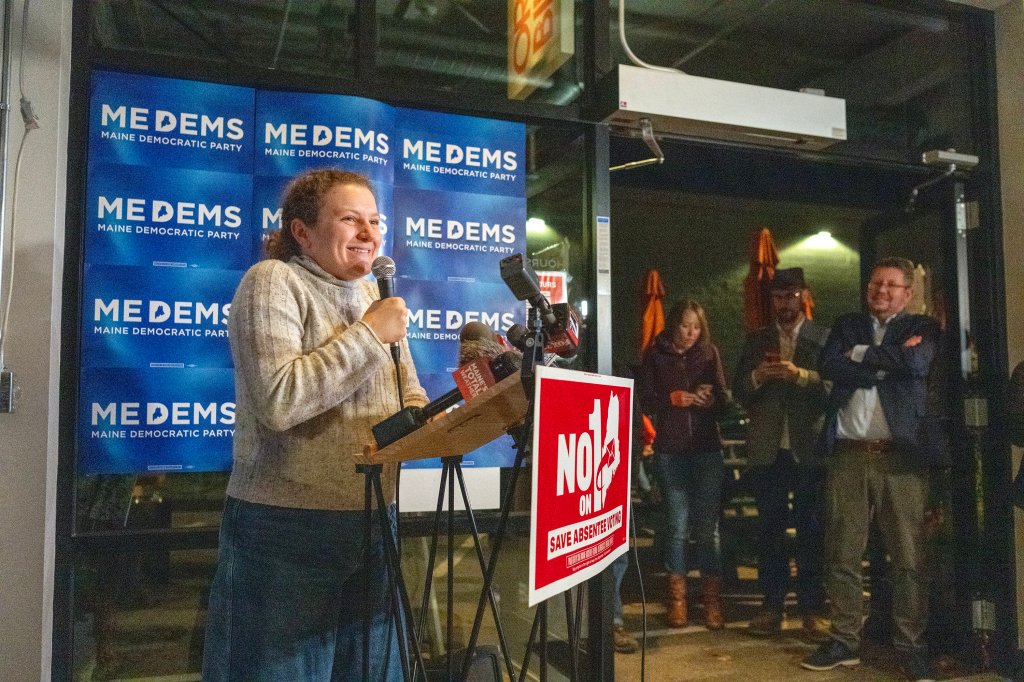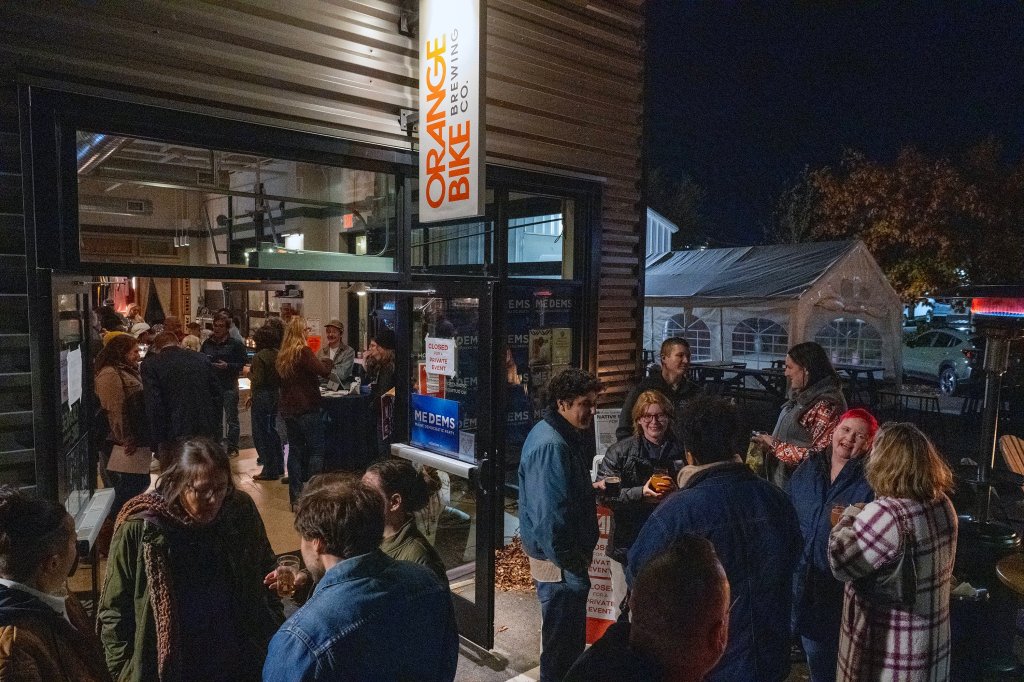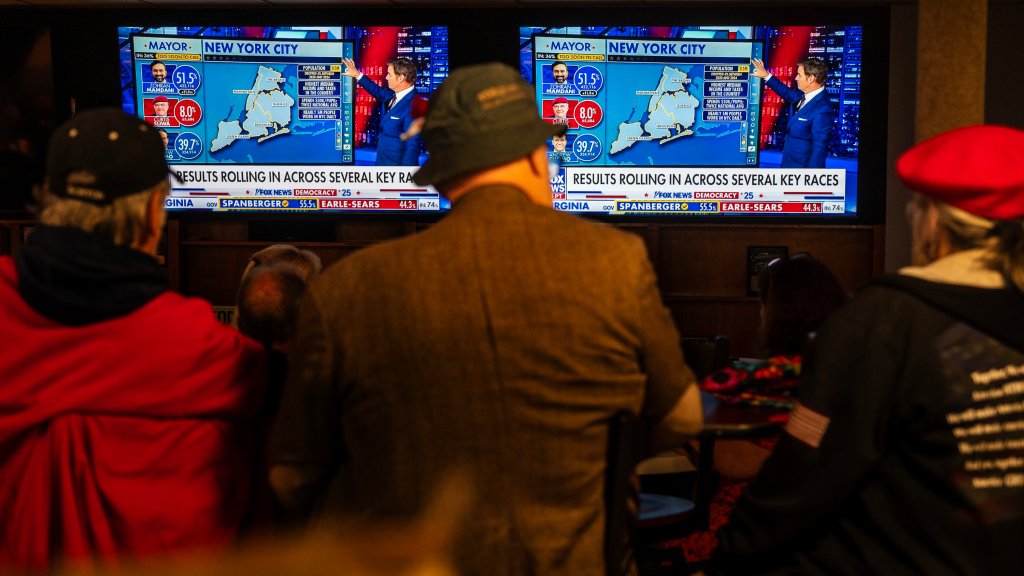
Maine voters on Tuesday soundly rejected a statewide referendum that would have required photo identification when casting ballots and restricted absentee voting.
Opponents of Question 1 declared victory shortly before 10 p.m. when they jumped out to an early but sizable lead. The Associated Press called the race shortly after.
Officials with the Maine Democratic Party said they hope Tuesday’s victory lays the groundwork for 2026, when they look to unseat Republican U.S. Sen. Susan Collins, retain the Blaine House and Maine’s two congressional seats and expand their majorities in the state Legislature.
“We are not going anywhere,” said Devon Murphy-Anderson, executive director of the Maine Democratic Party. “We will double down. We will use this momentum from tonight, and we will fight harder. And next year, you can bet that we will win.”
Shortly before 11 p.m.., the No on 1 campaign led with more than 61% support, with 57% of all votes counted.
Opponents crammed into Orange Bike Brewing Co. in Portland’s East Bayside neighborhood to wait for results. The mood was light and celebratory even before the first returns came in, and the celebration grew with their lead.
“Question 1 has been defeated!” party chairman Charlie Dingman said to loud applause. “Mainers understood Question 1 and answered with a resounding no!”

The election party, cohosted by the Maine Democratic Party and Save Maine Absentee Voting, a coalition of 35 organizations, drew prominent Democrats, including Gov. Janet Mills, as well as those running for the U.S. Senate and for governor.
Mills sent a statement shortly before 11 p.m. applauding the outcome.
“Once again, Maine people have affirmed their faith in our free, fair, and secure elections, in this case by rejecting a direct attempt to restrict voting rights,” she said.
Dingman said opponents, including Democratic primary candidates, mounted an unprecedented campaign during an off-year election cycle to reach voters at their homes and on their phones.
Proponents of the measure did not hold a public event on election night. Leaders of the Yes on 1 campaign, Rep. Laurel Libby of Auburn and Alex Titcomb, released a statement after the referendum was called.
“Polls show Maine voters support Voter ID. Unfortunately, Maine has a partisan Secretary of State who used her powerful position to weaponize the ballot question,” they said. “Ultimately, Maine voters did not have the opportunity to vote on Voter ID. The opposition claimed that Question 1 would get rid of absentee voting, and centered their campaign on that fiction. Instead of honestly debating the merits of Voter ID, they spread lies and fear, convincing voters to vote against their own interests.”
In Augusta, many prominent Maine Republicans gathered for a watch party but the mood soured by 9:30 p.m. Tuesday. Chuck Ellis, a conservative podcaster who wore a T-shirt advocating for the passage of voter ID requirements, said he was frustrated by what he saw as “misleading” wording of Question 1. Ellis said he thought if voters saw the proposal for what it was — “a common sense measure” — they would have voted yes.
“They might as well have worded it. ‘Do you want to murder puppies?” Ellis said.

STRONG TURNOUT
Voter turnout was expected to be light across the state in an off-year election without any major offices up for grabs, but election officials said throughout the day that turnout exceeded expectations.
Returned absentee ballots outpaced the 2023 election. More than 121,000 voters had requested absentee ballots, and nearly 77,000 had returned them by Oct. 28.
Question 1 was placed on the ballot by conservative activists with the Dinner Table PAC, but it’s part of a national push from Republicans to institute voter ID. The largest financial donor for the Yes on 1 campaign was the Republican State Committee, which gave $525,000.
While much of the proponents’ campaign played out on social media, Democrats mobilized on the ground. The Democratic National Committee’s organizing team contacted over 86,000 voters, a spokesperson said.
In addition to the ID requirement, Question 1 sought to add restrictions for absentee voting, including eliminating two days of in-person early voting. It also would have prohibited requests by phone and from family members for absentee ballots, prevented people from receiving absentee ballots annually without requesting them and limited the number of ballot drop boxes, among other changes.
“Question 1 was a voter suppression bill that would have erected unnecessary barriers to voting,” said Jen Lancaster, spokesperson for the League of Women Voters of Maine. “A large number of Maine voters depend on absentee voting to cast their ballot. It’s important to protect this vital service and not dismantle it piece by piece.”
Opponents held a significant fundraising advantage throughout the campaign, spending more than $2 million, compared to proponents, who had spent about $600,000 through Oct. 21. Save Maine Absentee Voting, the lead opponent, spent more than $1 million.
‘WE WILL FIGHT’
The Maine Republican Party tried to make the issue a referendum on Secretary of State Shenna Bellows, who is seeking the Democratic nomination for governor. Republicans have repeatedly pointed to an incident earlier this month, in which a Newburgh woman found 250 absentee ballots in a battered Amazon box as reason to support Question 1.
But the proposal had nothing to do with how ballots are shipped and that it would be virtually impossible for anyone to cast those ballots, since election clerks track requests and confirm they’re from registered voters before counting them.
The incident is being investigated by local law enforcement and the FBI.
National Democrats applauded the result.
“Tonight’s results are a major win for all Mainers,” DNC chair Ken Martin said. “Mainers sent a clear message tonight: Our democracy and fundamental rights to vote and choose our own leaders are not for sale.”
Murphy-Anderson, the Maine Democratic Party director, said she was “livid” about having to spend time and resources campaigning against Question 1, which she said sought to “solve problems that do not exist in our election system.”
She had a message for Republicans and their billionaire backers.
“If you want to continue your attack on rural Mainers, on working Mainers, on Mainers with disabilities, with Mainer’s who are seniors, you can expect us to meet you on that field,” she said. “You can expect us to go toe to toe with you. And we will fight, and we will win every damn time.”
